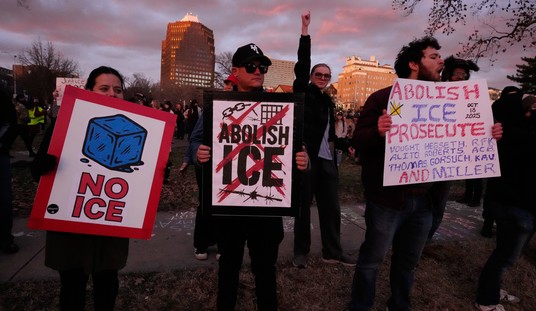We can thank the public-sector unions in Wisconsin for one thing — they gave a great example of why right-to-work principles in the public sector matter. That lesson reached around the world, as Chile demonstrated this week. Chile’s legislature rejected an effort by the Left to amend their constitution to allow for PEU collective bargaining and strikes, but it was a close call:
After two days of debate, a proposed change to Chile’s constitution allowing collective bargaining privileges and a “right” to strike for public unions was voted down. The change got just 21 votes, four short of a two-thirds needed. Even many of the left-leaning opposition abstained. …
All this is relevant because Chile is the first nation whose return to democracy was based on economic freedom. On global economic freedom rankings, Chile stands near the top — in part because its public employees can’t run up debt or corrupt the political process.
The existing constitution makes Chile a full right-to-work country and expressly prohibits government collective bargaining and public employee strikes.
The idea is to prevent the ugly anti-democratic dynamic — now seen in Wisconsin and elsewhere — of public employee unions extorting concessions from politicians in exchange for campaign support.
The constitutional bar on PEU activities was no accident. The Chilean constitution was established in 1980 during the reign of dictator Augusto Pinochet with the explicit intention of moving Chile towards full democracy. The legislature has amended the constitution dozens of times since Pinochet lost his plebiscite in 1988, but the bar on strikes and collective bargaining in government (which doesn’t apply, apparently, to the private sector) has remained. Its author, Labor and Social Security Minister Jose Pinera, put it in place specifically to prevent what happened in Wisconsin earlier this year, and to prevent politicians from selling out taxpayers to labor unions.
Wisconsin unions claimed the rollback of PEU privileges in the state (which still exceed those given in Chile) was an attack on the entire middle class. How is Chile’s middle class doing? Last quarter, Chile had an annualized GDP growth rate of 7% and per capita income has risen to $17,000, ten times what it was in 1980 at the adoption of the constitution. According to the CIA World Factbook, their population below the poverty line in 11.5%, one of the lowest in the hemisphere, and slightly below ours at 12%. Neighboring Argentina, for instance, has 30% living below the poverty line with a similar per-capita income, indicating a great deal more stratification. And let’s remember that Chile suffered a massive earthquake last year that seems to have barely dented their economic strength.
It seems as though Chile knows how to handle its economy and its government. They may have learned a lesson from Wisconsin; maybe we can learn a few lessons from them, including their entirely privatized Social Security system.








Join the conversation as a VIP Member